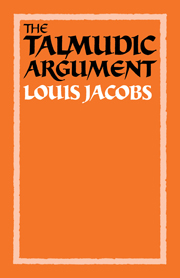Book contents
- Frontmatter
- Contents
- Preface
- Note on transliteration
- Note on Biblical translations
- Note on the Babylonian Talmud
- List of Abbreviations
- 1 The Talmudic argument
- 2 The literary form of the Babylonian Talmud
- 3 Berērah: retrospective specification
- 4 Yeúsh she-lo mi-da‘at: unconscious abandonment of property
- 5 Rubba: probability
- 6 Davar she-lo ba le-'olam: conveyance of a thing not yet in existence
- 7 Kol she-eyno be-zeh aḥar zeh afilu be-vat aḥat eyno: whatever cannot be established in a consecutive sequence cannot be established even in a simultaneous sequence
- 8 Yesh ḥoresh telem eḥad: a single act of ploughing can result in a number of penalties
- 9 Simanin de-oraita o de-rabbanan: whether reliance on distinguishing marks for the purpose of identification is Biblical or Rabbinic
- 10 Devarim she-be-lev eynam devarim: mental reservations in contracts are disregarded
- 11 Ḥazakah: presumptive state
- 12 Gadol kevod ha-beriot: the law and regard for human dignity
- 13 Hazmanah milta: whether the designation of an object for a particular use is effective
- 14 Mitzvat ‘aseh she-ha-zeman geramah: positive precepts dependent on time from which women are exempt
- 15 Heyzek she-eyno nikar: indiscernible damage to property
- 16 Kinyan ḥatzer: acquisition by means of a domain
- 17 Palginan be-dibbura: admission of part of a testimony even though another part of the same testimony is rejected
- 18 Tadir u-mekuddash: which takes precedence: the more constant or the more sacred?
- 19 Palga nizka: the nature of the payment of half-damages to which the owner of a goring ox is liable
- 20 Patur mi-diney adam ve-ḥayyav be-diney shamayim: cases where there is liability in the eyes of God even though the human courts cannot enforce payment
- 21 Maḥal ‘al kevodo kevodo maḥul: renunciation of honour by one to whom it is due
- 22 Conclusions
- Glossary
- Bibliography
12 - Gadol kevod ha-beriot: the law and regard for human dignity
Published online by Cambridge University Press: 06 January 2010
- Frontmatter
- Contents
- Preface
- Note on transliteration
- Note on Biblical translations
- Note on the Babylonian Talmud
- List of Abbreviations
- 1 The Talmudic argument
- 2 The literary form of the Babylonian Talmud
- 3 Berērah: retrospective specification
- 4 Yeúsh she-lo mi-da‘at: unconscious abandonment of property
- 5 Rubba: probability
- 6 Davar she-lo ba le-'olam: conveyance of a thing not yet in existence
- 7 Kol she-eyno be-zeh aḥar zeh afilu be-vat aḥat eyno: whatever cannot be established in a consecutive sequence cannot be established even in a simultaneous sequence
- 8 Yesh ḥoresh telem eḥad: a single act of ploughing can result in a number of penalties
- 9 Simanin de-oraita o de-rabbanan: whether reliance on distinguishing marks for the purpose of identification is Biblical or Rabbinic
- 10 Devarim she-be-lev eynam devarim: mental reservations in contracts are disregarded
- 11 Ḥazakah: presumptive state
- 12 Gadol kevod ha-beriot: the law and regard for human dignity
- 13 Hazmanah milta: whether the designation of an object for a particular use is effective
- 14 Mitzvat ‘aseh she-ha-zeman geramah: positive precepts dependent on time from which women are exempt
- 15 Heyzek she-eyno nikar: indiscernible damage to property
- 16 Kinyan ḥatzer: acquisition by means of a domain
- 17 Palginan be-dibbura: admission of part of a testimony even though another part of the same testimony is rejected
- 18 Tadir u-mekuddash: which takes precedence: the more constant or the more sacred?
- 19 Palga nizka: the nature of the payment of half-damages to which the owner of a goring ox is liable
- 20 Patur mi-diney adam ve-ḥayyav be-diney shamayim: cases where there is liability in the eyes of God even though the human courts cannot enforce payment
- 21 Maḥal ‘al kevodo kevodo maḥul: renunciation of honour by one to whom it is due
- 22 Conclusions
- Glossary
- Bibliography
Summary
The sugya is Berakhot 19b-20a. The term gadol kevod ha-beriot, lit. ‘great is the dignity of human beings’, occurs in the sugya and is the central point of the whole discussion. The problem considered is, under which circumstances can there be a relaxation of the law where the purpose is to safeguard human dignity?
The sugya opens with a statement by the early-third-century Babylonian Amora, R. Judah, in the name of his master, Rav: ‘If one finds kilayim (a mixture of wool and flax, Leviticus 19: 19) in his garment, it must be stripped off even in the market place.’ The reason is: because Scripture says: ‘there is no wisdom nor understanding nor counsel against the Lord’ (Proverbs 21: 30), which means: ‘Wherever there is a profanation of God's name no respect is to be paid to a teacher’, i.e. where regard for the dignity of a teacher, and a fortiori an ordinary person, is in conflict with the requirements of the law, it is the former that must yield.
An objection is raised from a Baraita dealing with a mourner and the congregation which accompanies him on the return from a funeral. If the mourner decides to return by way of an unclean path, i.e. a path that crosses a field in which there are graves, the congregation should follow him in that path out of respect for him (i.e. even if some of them are priests who are forbidden to become contaminated by a corpse or a grave (Leviticus 21: 1)). Thus we see that a prohibition is set aside out of regard for human dignity and thus contradicts Rav's ruling.
- Type
- Chapter
- Information
- The Talmudic ArgumentA Study in Talmudic Reasoning and Methodology, pp. 115 - 121Publisher: Cambridge University PressPrint publication year: 1984



